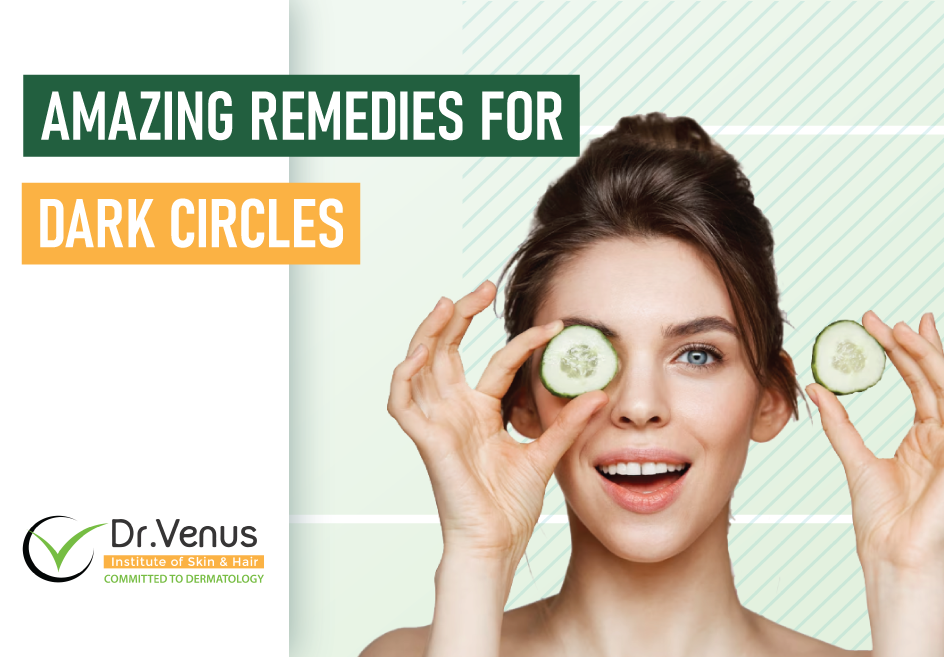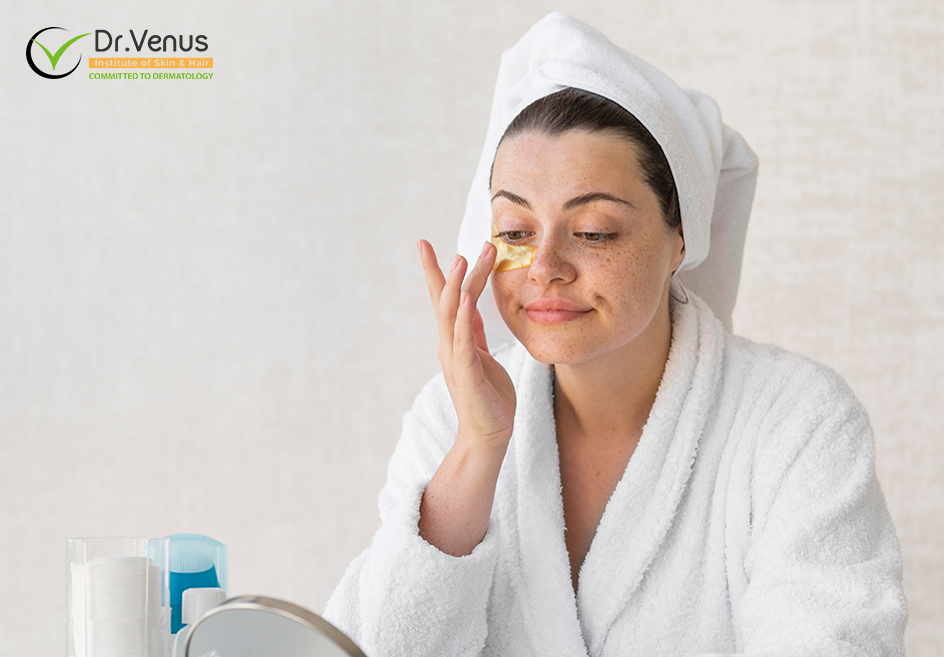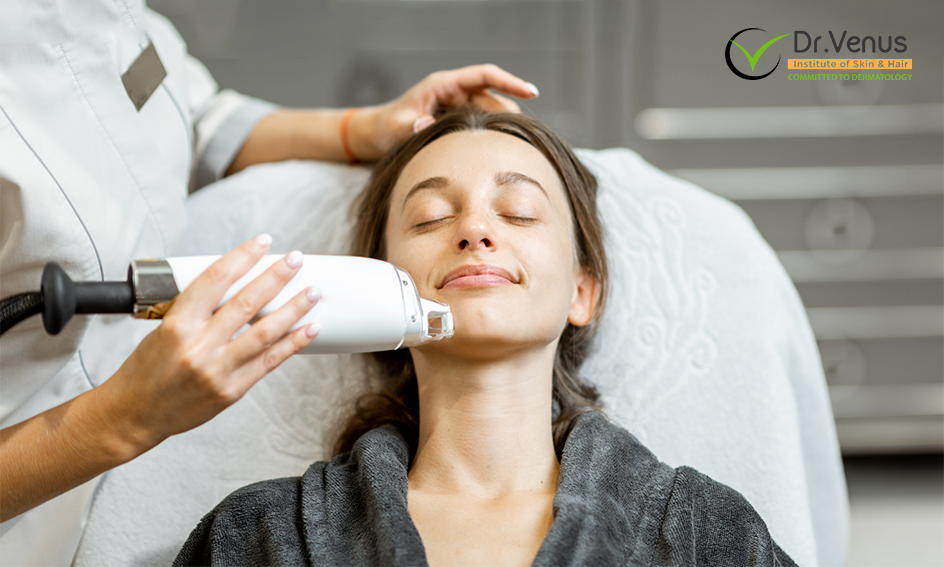Dark circles under the eyes, also known as periorbital hyperpigmentation (POH), are a common cosmetic concern for many people. They can make you appear tired, older, or less healthy than you feel. Let’s delve into the causes, remedies, and treatment options for dark circles, with a focus on understanding this common issue.
Causes of Dark Circles
1. Age
As we age, our skin naturally undergoes changes. It becomes thinner and loses some of its elasticity due to decreased fat and collagen. This can make the blood vessels under the eyes more visible, leading to dark circles. Aging may also cause tear troughs to appear hollow, contributing to the tired appearance.
2. Fatigue
Fatigue and a lack of sleep are often associated with dark circles. Sleep deprivation can make your skin paler, which accentuates the appearance of dark circles. Additionally, it can lead to fluid build-up under the eyes, causing puffiness and shadows that contribute to the dark circle effect.
3. Allergies
Dark circles may result from allergic reactions and dry eyes. Histamines released during an allergic response can lead to itchy, red, and puffy eyes. Scratching the itchy skin may result in inflammation, swelling, and broken blood vessels, leading to post-inflammatory pigmentation.
4. Ocular Hypotensive Drugs
Certain eye medications used to treat conditions like glaucoma, such as latanoprost and bimatoprost, may cause or exacerbate dark circles. Changes in pigmentation can develop, which is more likely to occur several months after starting treatment.
5. Eye strain
Extended periods of staring at screens, whether from a computer or television, can strain your eyes. This strain may enlarge the blood vessels around your eyes, potentially causing dark circles.
6. Dehydration
Dehydration can lead to sunken eyes and dull-looking skin under the eyes, making dark circles more noticeable. The proximity of the eyes to the underlying bone accentuates this effect.
7. Sun Overexposure
Prolonged exposure to the sun or injury can cause dark circles, known as post-inflammatory pigmentation. Excessive sun exposure can lead to an overproduction of melanin, depositing excess pigment beneath the eyes and resulting in hyperpigmentation.
8. Genetics
The appearance of black circles may be significantly influenced by genetics. Some individuals have a genetic predisposition to this condition, which may appear early in childhood and change in intensity over time.
9. Anemia
Anemia, characterized by low levels of red blood cells, can cause fatigue, weakness, and pale skin. Dark circles may be a visible sign of anemia. Treating the underlying anemia can often lead to the disappearance of dark circles.
10. Lifestyle Factors
Lifestyle choices like smoking and excessive alcohol consumption have been linked to the development of dark circles. These factors can exacerbate the appearance of dark circles under the eyes.
Diagnosis of Dark Circles
While dark circles under the eyes are typically not a cause for concern, if they worsen, cause discomfort, or become increasingly prominent, it is advisable to consult a doctor or dermatologist. A medical professional can conduct various tests, including a physical and medical history examination, eyelid stretch test, slit lamp exam, and blood and liver function tests. These assessments can help classify the appearance and causes of dark circles, which may include pigmented, post-inflammatory, vascular, structural, or mixed-type dark circles.
Dark Circles Treatment
At-Home Remedies
Sleep: Ensure you get seven to eight hours of quality sleep each night to reduce the appearance of dark circles caused by fatigue.
Cold Compress: Applying a cold compress to the under-eye area for 20 minutes can help constrict blood vessels and diminish dark circles. This is a proven and widely used dark circles treatment.
Sun Protection: Minimize sun exposure to your face, and always wear sunscreen or protective clothing when exposed to sunlight.
Moisturizers: Over-the-counter moisturizers containing ingredients like caffeine, vitamin E, aloe, hyaluronic acid, and retinol may help reduce the appearance of dark circles.
Cucumber: Chill thick cucumber slices and place them on your dark circles for about 10 minutes. Repeat this treatment twice a day.
Almond Oil and Vitamin E: Mix equal amounts of almond oil and vitamin E and gently massage the mixture into dark circles before bedtime. Rinse the area with cold water in the morning. Repeat nightly until the dark circles improve.
Tea Bags: Soak caffeinated tea bags in warm water, chill them in the refrigerator for a few minutes, and place one bag on each eye for five minutes. Rinse the area with cold water.
Medical Treatments
For those seeking a more permanent solution, several medical dark circles treatments are available to reduce the pigmentation around the eye. Consult with a medical professional before undergoing any invasive procedures:
Skin-Lightening Cream: Dermatologists may prescribe skin-lightening creams containing ingredients like azelaic acid, kojic acid, glycolic acid, or hydroquinone to address under-eye hyperpigmentation.
Laser Therapy: Laser treatments target darker pigmentation beneath the eyes and can induce collagen formation, improving the appearance of dark circles.
Chemical Peels: Light chemical peels containing glycolic acid, retinoic acid, or hydroquinone can reduce pigmentation under the eyes. Under eye skin peels, which include a combination of salicylic acid, lactic acid, and resorcinol, may also be recommended.
Fillers: Hyaluronic acid-based dermal fillers can be injected beneath the eyes by healthcare providers to address volume loss and help in dark circles treatment.
Surgical Implants: Procedures involving fat or synthetic product implants can be considered to increase the effectiveness of dark circles treatment.
When to Seek Medical Advice
If you notice swelling and discolouration under only one eye or if your dark circles worsen over time, it is advisable to consult the expert dermatologist from Dr.Venus skin and hair clinic for a proper diagnosis and potential treatment options.
Conclusion
Dark circles under the eyes are a common cosmetic concern and can result from various factors, including age, fatigue, allergies, and genetics. While there are multiple at home remedies and medical treatments available, dark circles may not always require intervention and can be accepted as a natural part of aging. Consult with the experts at Dr.Venus skin and hair clinic to determine the most appropriate approach to address your specific concerns and preferences. Remember, there’s no one-size-fits-all solution for dark circles treatment, decisions should be made in consultation with experts from Dr.Venus Skin and Hair clinic.


